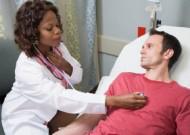Deadly stroke

 Samuel Runqu is a 49 year-old father of five kids who lives in Sandton, Johannesburg. On a wintry day in July, this year, he suffered what doctors called a ‘mild stroke’.
Samuel Runqu is a 49 year-old father of five kids who lives in Sandton, Johannesburg. On a wintry day in July, this year, he suffered what doctors called a ‘mild stroke’.
‘I didn’t realise I was having a stroke. I started sweating a lot, losing balance, and, then, I collapsed’, says Samuel Runqu.
He was then quickly taken to Morningside Hospital’s emergency care, where, after a couple of tests it was found that his blood pressure was very high and was the cause of his light stroke.
After the stroke, Runqu was unable to do anything for himself. He needed the assistance of his wife to do even the most basic of things such as brushing one’s teeth.
‘My mind was sort of forgetting things, I could not catch up quickly and my tongue was stiff. I could not walk for two months. I was weak, dizzy and I had no balance. I was very scared. I was worried and scared. I thought it was the end of me. l couldn’t do anything’, says Runqu.
Runqu is slowly recovering. He is now able to walk, although he is limping. He says his brain is still not at its best, as he tends to forget a lot of things. But physiotherapy and a healthy eating plan are helping him a lot.
‘They’ve now put me on diet… eating less’¦ I’m a big man, so I’m trying to get my body down and my stomach down’, he says.
Dr. Andre Mochan, a specialist neurologist working at Charlotte Maxeke Johannesburg Academic Hospital, explains what a stroke is.
‘A stroke is a sudden brain-attack. What happens with the stroke is a sudden neurological problem which can manifest in different ways, for example, paralysis on the one side of the body, loss of speech’¦ that sort of thing’, says Dr. Mochan.
He says a stroke often gives a warning before occurring. He advised patients to rush to a doctor when they experience these warning signs.
‘Sometimes, there are warning episodes where there is a transient event.
Let’s say, for example, weakness or paralysis on one side of the body, which resolves in a few minutes to hours, then it, returns and goes away again. There can be such warning symptoms’, says Dr. Mochan.
Dr. Mochan says stroke is mostly a lifestyle-induced condition. He says adopting a healthy lifestyle can reduce stroke risk factors. The risk factors in the case of Samuel Runqu, were that he was over-weight and he ate a whole lot of foods that were high in fat and sugar content.
‘The risk factors for a stroke are the same as a heart-attack and they include high blood pressure, sugar diabetes and high cholesterol’, he says.
He says stroke is most common in the elderly.
‘It’s typically a disease of the elderly. The risk increases naturally in the population over 50 years [of age]. Stroke is the second or third cause for deaths. So, it’s a big global health problem and even in a country like South Africa, where we’re dealing with AIDS and TB, there is a certain age population where stroke remains a common and frequent disorder’, says Dr. Mochan.
For a lucky few like Samuel, they can recover from a mild stroke episode with minor degrees of disability, but others are not so lucky.
‘You can fully recover from a stroke, you can die from a stroke and you can be left with varying degrees of disability from a stroke’, concludes Dr. Mochan.
Author
Republish this article
This work is licensed under a Creative Commons Attribution-NoDerivatives 4.0 International License.
Unless otherwise noted, you can republish our articles for free under a Creative Commons license. Here’s what you need to know:
You have to credit Health-e News. In the byline, we prefer “Author Name, Publication.” At the top of the text of your story, include a line that reads: “This story was originally published by Health-e News.” You must link the word “Health-e News” to the original URL of the story.
You must include all of the links from our story, including our newsletter sign up link.
If you use canonical metadata, please use the Health-e News URL. For more information about canonical metadata, click here.
You can’t edit our material, except to reflect relative changes in time, location and editorial style. (For example, “yesterday” can be changed to “last week”)
You have no rights to sell, license, syndicate, or otherwise represent yourself as the authorized owner of our material to any third parties. This means that you cannot actively publish or submit our work for syndication to third party platforms or apps like Apple News or Google News. Health-e News understands that publishers cannot fully control when certain third parties automatically summarise or crawl content from publishers’ own sites.
You can’t republish our material wholesale, or automatically; you need to select stories to be republished individually.
If you share republished stories on social media, we’d appreciate being tagged in your posts. You can find us on Twitter @HealthENews, Instagram @healthenews, and Facebook Health-e News Service.
You can grab HTML code for our stories easily. Click on the Creative Commons logo on our stories. You’ll find it with the other share buttons.
If you have any other questions, contact info@health-e.org.za.
Deadly stroke
by siphosethustuurman, Health-e News
November 3, 2011
